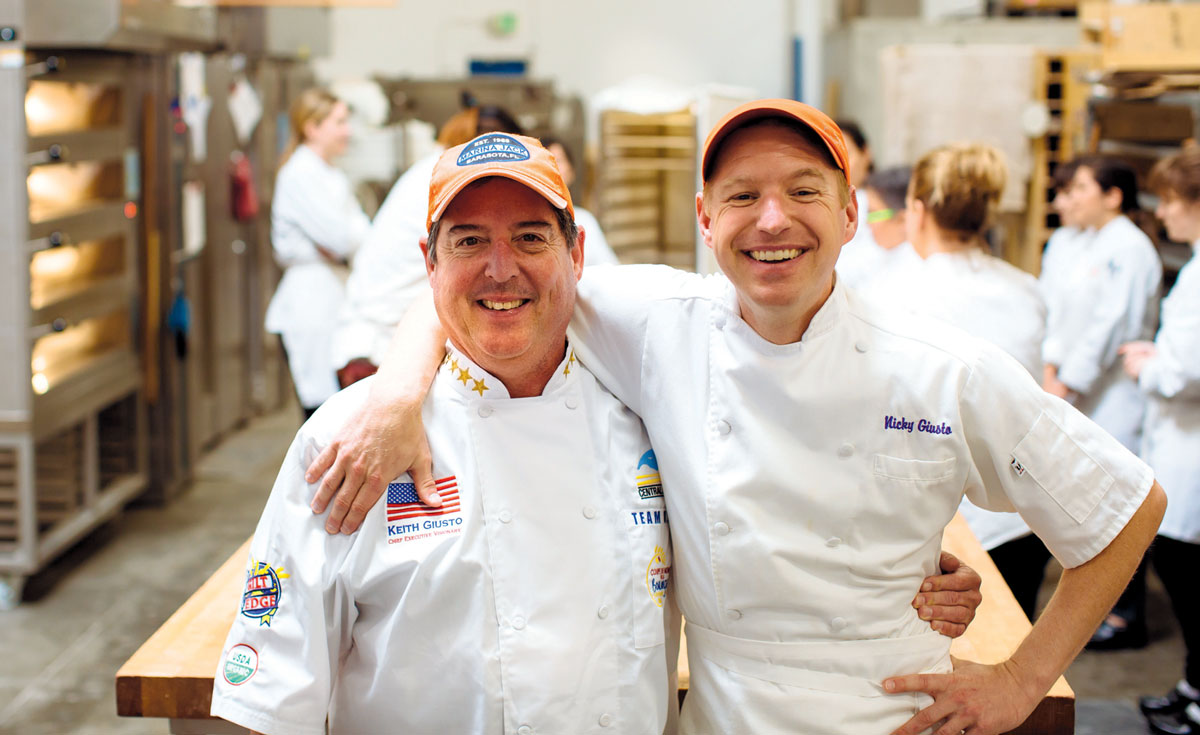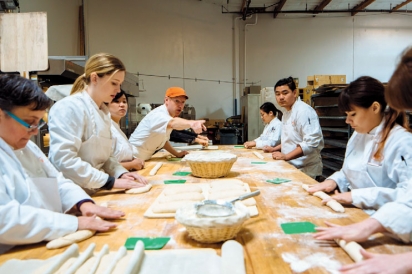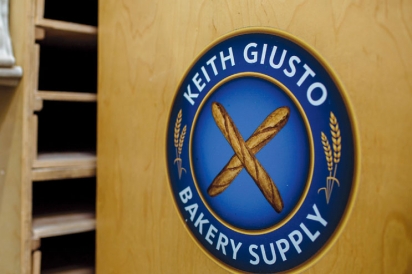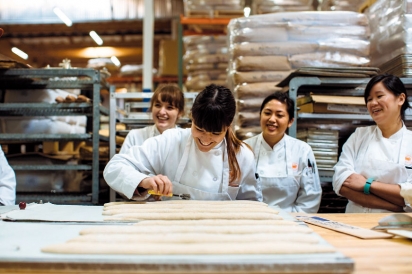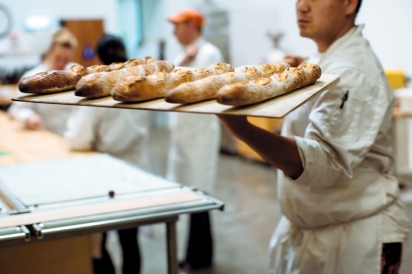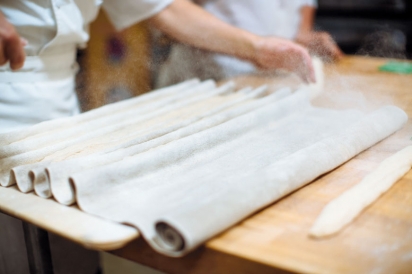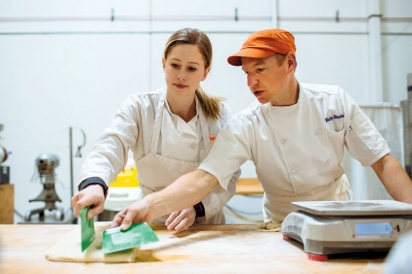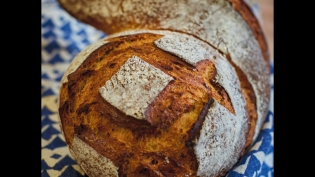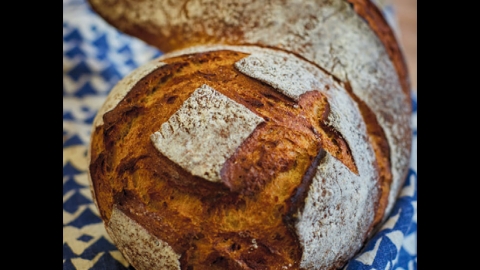Born to Bake Better Bread
The Giusto Family Completes the Circle of Farmer, Miller, Baker and Teacher
“Bread deals with living things, with giving life, with growth, with the seed, the grain that nurtures. It’s no coincidence that we say bread is the staff of life.”
—Lionel Poilâne, French master baker (1945–2002)
In 2012, I authored a three-part series titled “Surfing Amber Waves of Grain” for Edible Marin & Wine Country that explored the ancient trinity of farmer, miller and baker, interwoven callings that provide strength, sustenance and health to the heart of local food systems. Over the last century, many local foodsheds across America lost these vital connections, ceding way to the consumption of mass-produced breads and other baked goods that oft en travel great distances to reach store shelves.
Still, there remained a dedicated few who continued to practice the arts of growing ancient grains, milling them and then baking them into healthy, nurturing and delicious offerings. The Giusto family of Sonoma County are members of this select group of artisans. Following in the path of their great-grandparents, grandparents and parents, Keith Giusto and his nephew, Nicky Giusto, continue to practice these ancient craft s, as well as creating a space where they can share their knowledge with others, spreading the gospel of better bread.
In Italian, giusto can mean just, exact, righteous and equitable. These are certainly words that describe the way that both Keith and Nicky Giusto appear to approach their shared vocation. From the soil to the seeds to the milling to the fermenting process to the baking of bread, they study and meticulously track every aspect of their craft , including their whopping mistakes that sometimes lead to creations like Keith’s James Beard Award—winning sourdough bread.
Most of all, these two Giustos bring joy, creativity and wonder to baking. You can feel it as Keith shares his foibles and successes and in the way he hugs his nephew. You can hear it in Nicky’s voice and watch it in his hands as he teaches a class of eager young bakers.
“My uncle always jokes that we were bred to bake bread,” Nicky laughs as he tells me about his family history. Nicky’s great-grandfather (and Keith’s grandfather), Matthew Giusto, was born in a flour mill in the town of Varazze, in the Ligurian region of northwest Italy. Matthew’s father was a miller, which makes Nicky the fifth generation of Giustos in the bread business. In the late 1930s Matthew moved from Italy to San Francisco, where he met and married Amelia Farpo. Amelia and her family had moved to the States from the hills outside of Cogoleto, a brief car ride from Varazze.
Nicky’s cousins Salvio and Albertina Rossi still own and operate Pasticceria Rossi Lino, a bakery and chocolate maker in the heart of Cogoleto. Nicky showed me breathtaking photos of the shop and the town overlooking the Mediterranean, taken on a visit he and his wife made last year. Staying connected to the family lineage, yet looking to the future, is a Giusto trait.
Matthew and Amelia Giusto opened The Golden Crescent health food store and bakery in San Francisco in 1940, with the help of a loan from A.P. Giannini’s Bank of America (Giannini is credited with many innovative banking practices, one of which was offering banking services to middle-class Americans, not just the upper class). Great-grandmother Amelia was ahead of her time, a deeply spiritual woman into yoga, health food and macrobiotic foods. At a time when American agriculture was under the sway of the “Green Revolution”—embracing the use of synthetic chemical fertilizers, herbicides and insecticides—the Giustos sourced organically grown grains and Matthew milled them himself. They baked and sold some of the first commercially produced sprouted grain breads at their Polk Street store.
Matthew and Amelia passed the business on to their sons, Albert and Fred. By then the bakery had become so popular that they decided to focus on that and let go of the health food store side of the enterprise. Fred was a talented machinist and millwright and kept the operational side of things running smoothly. Albert was a great baker, but he also had a particular gift for finding top-quality ingredients. Together, the brothers are credited with helping to create standards for organic flours and grains in the United States, and for advancing the natural and organic food movement in general.
Carrying on their parents’ and grandparents’ legacies, Albert and Fred incorporated their own children into the family business as they came of age. This included Albert’s son Keith and his brother Michael, Nicky’s father. Albert and Fred continued to run the company until it was sold in 2007.
Several years before the sale, Keith had left the family business to start his own bakery, Full Circle Baking, in Penngrove, as well as to help Utah-based Central Milling build a local following for its high-quality flours. Keith’s father had met the Perry family who operated Central Milling on one of his sourcing explorations around the country in the 1960s, and the two families had formed a lifelong friendship.
Nicky says he was encouraged by his grandmother—Albert’s wife, Ruth—to go to college and pursue a vocation outside of the family baking world. He did so, even working for the tech company Autodesk for a stint, before the call of his family’s legacy became too great to ignore.
Keith eventually sold Full Circle and today he and Nicky are both managing partners along with members of the Perry family in employee-owned and -operated Central Milling. The oldest continually operating company in the state of Utah, Central Milling has been providing high-quality flours to bakeries and home bakers since 1867. The company’s website states “We are the Farmer, the Miller, and the Baker working together with nature to preserve our farmland for tomorrow while educating the bakers today.”
According to Nicky, the company’s relationships with their farmers are sometimes several generations deep. They insist that the grains they purchase are grown either organically or under the sustainability guidelines provided by Central Milling. The industry standard practice of post-harvest fumigation is prohibited. Before purchase, grains are tested for color, flavor and performance. Having passed muster, grains are shipped to the company’s mill alongside Utah’s Logan River, where they are milled slow and cool to minimize damage to the wheat. Water from the river powers the turbines used for milling.
Keith and Nicky operate Central Milling’s location in Petaluma, which consists of a training facility and bakery they informally refer to as the Bakeshop (although Nicky says the name might stick), as well as running the separately owned Keith Giusto Bakery Supply. Both businesses are housed in the same location on Petaluma’s Holm Road, an impressive 35,000-square-foot space housing every conceivable baking ingredient, along with 4,000 square feet of kitchen and workshop space. On the day of my tour, led by Nicky and a spunky little canine named Mojo, skateboards are scattered around the floor for getting to and fro in the large space.
Bakeshop is used for research, development and training, as well as classes and workshops, many of which are open to non-professionals, just regular old folks who like to bake. In order to expand their educational offerings, the company is remodeling Bakeshop to house two kitchen spaces: one that will be equipped for professional bakers and another that will be outfitted like a traditional home kitchen so that students at both levels can have a real world experience. The building’s exterior landscaping is also being converted to herb and vegetable gardens, as well as plots of grain.
One of the hallmarks of the service culture at Central Milling is the level of education and support they offer to their wholesale customers, to make sure they are getting the most out of the company’s products. Keith reports that he just finished a project with Safeway where he developed an organic sweet French baguette alongside the megacorporation’s in-house bakers. Keith had to develop a recipe in four days that would work with Safeway’s equipment and staff, within the high-volume seller’s time constraints. Keith is clearly excited about this collaboration and said, “It’s important to have healthy, delicious bread easily available to everyone, no matter what their income is. I want to see more nutritious, organic products for the masses.”
Keith was also there in the late ‘80s to support Rachel and Andy Berliner when they started Sonoma County—based Amy’s Kitchen. The birth of the Berliners’ daughter, Amy, spurred them to want to create delicious, organic, vegetarian, easy-to-prepare convenience foods, and Keith was able to help them source everything from organic grains to beans. He also works with chefs like Tony Gemignani (San Francisco’s reigning pizzaiolo and winner of the 2016 World Pizza Championships, his 12th time) to create the perfect flour mixture for their needs. As a matter of fact, you can buy a bag of “Tony Gemignani’s California Artisan Type 00” flour blend at Keith Giusto Bakery Supply and challenge Tony at next year’s championships if you’re up for it. But you should probably take a class first …
It’s early morning and I’m watching Nicky teach an eight-hour baguette class to the pastry arts students from the San Francisco Cooking School. Country music plays loudly throughout the huge building. There is a great deal of waiting in a baking workshop (and in baking)—the dough is mixing, the dough is rising, the dough is being folded again—and in those pauses Nicky shares stories like his Uncle Keith’s sourdough bread mistake/success as he stresses to his students the importance of keeping precise and detailed notes on whatever they are making, even if it appears it won’t turn out well, or as planned.
He had previously shared with me his belief that “real artists bake with their hands,” and his concern that “feel baking” is becoming a lost art, forgotten in the teachings of some baking schools. He wants his Bakeshop workshops to impart very practical knowledge, along with an artisan’s sensibility.
Nicky teaches in a very hands-on manner and has the students smelling the dough and poking holes in the dough to see if the edges are ragged or smooth. He encourages them to fold, shape and cut without fear.
He warns them that once they get jobs they should not forget to “play at baking.” Making the same items day after day can be stifling—so make time to experiment, he admonishes. “Call me up,” he says. “I’ll send you some unusual flours and give you something to help you jump outside the box. I’m here for you anytime.”
The director of the San Francisco Cooking School’s Pastry Arts program, Nicole Plue, is watching over her pupils being trained by Nicky. Plue, a star in her own right having received the 2010 James Beard Award for Outstanding Pastry Chef, stresses how valuable it is to bring her students to work with master bakers like Nicky.
Leaving Nicky’s class, I walk through the Keith Giusto Bakery Supply side of the building and find Keith himself helping a customer who is looking for flour to make special Belgian waffles for her family. He asks her lots of questions about how her perfect waffle would taste, what chewing it should feel like, and then he picks out just the flour he thinks would suit her. “My name’s Keith. Just call and ask for me if the batter isn’t working, or if it’s not what you want. I’ll help you get just the right mixture for your best waffles ever.”
Local bakeries that use Central Milling’s flours include Acme, Alvarado Street, Brickmaiden, Della Fattoria, M.H. Bread & Butter and Tartine. You, too, can bake with their exceptional flours and find other baking ingredients by ordering online or stopping by their location at 1120 Holm Rd., Petaluma. Call the store at 707.778.1073 to find out about upcoming classes and workshops. CentralMilling.com.


